#general-election-2019
Text
thinking abt byler having cringefail dance sessions to random bowie records they stole from jonathan 🥰
#i cannot put into words how insane i am#but just#them having a lil dancey dance to some gayass tunes is so special to me#I LOVE THEM#picturing it in my mind rn to get me thru my studying#which btw guys#im dying pls send help#if i have to look at one more graph abt electoral statistics im gonna jump off a bridge#the turnout jn the 2019 general election was 67.3% wow so crazy and in 2017 it was 68.7% oh em jee!! but in 2001😱 it was 59.4% 😱😱#im going crazy.#byler
16 notes
·
View notes
Text

It’s not so much he’s “unelected,” as that he and the rest of the Tories in 2019 weren’t elected on a platform of austerity and massive cuts. The rhetoric was investment and levelling up. They can change PM 13 times, but they need to pursue the same mandate.
23 notes
·
View notes
Text
Once summer/any kind of warm weather is over for real I definitely have to do some kind of regular fitness workout again....
#i think i last used my exercise bike around the time of the last uk general election...oops#for people who use this weird measure of time called years: this was in 2019#(pointless observation but back then my hair was still long enough to put it in a ponytail during sports lol...good old times)#random stuff
2 notes
·
View notes
Text
The Indian Stock Markets and General Elections: Analyzing the Reactions in 2004, 2009, 2014, and 2019
The Indian stock markets, like their counterparts around the globe, are significantly influenced by political events, with elections being one of the most critical.
The general elections in India not only determine the political leadership but also set the tone for economic policies and reforms that can impact investor sentiment and market performance.
This article delves into the reactions of…

View On WordPress
#2004 general election#2009 general election#2014 general election#2019 general election#Bharatiya Janata Party (BJP)#Business-friendly environment#Economic growth#Economic policies#Economic reforms#Election mandates#Election results#financial crisis#Fiscal policies#General elections#Indian National Congress (INC)#Indian Stock Markets#Investor sentiment#Market performance#Market reaction#Market Volatility#Monetary easing#National Democratic Alliance (NDA)#Policy continuity#Political events and markets#Political stability#Post-election reaction#Pre-election scenario#Sensex#Stock market trends#United Progressive Alliance (UPA)
1 note
·
View note
Text
Congress is sure to win Shivamogga Lok Sabha constituency this time: CM Siddaramaiah
Shivamogga May 2 : Chief Minister Siddaramaiah expressed hope that the Congress will win the Shivamogga Lok Sabha constituency.He was speaking at the Prajadhwani-2 Lok Sabha election campaign organized in Shivamogga city today on behalf of party candidate Geeta Shivaraj KumarSitting MP B. Y. Raghavendra is a waste as a parliamentarian who does not made the effort to speak in the parliament on…
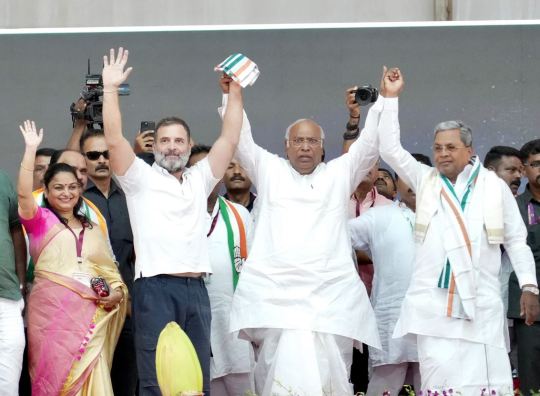
View On WordPress
#"please wait till the Lok Sabha elections. After that I will not allow this Kumaraswamy to continue as chief minister#"This was atrocious. I was present in the public meeting during 2019 Lok Sabha elections#AICC Former President Rahul Gandhi#AICC General Secretary Randeep Singh Surjewala#AICC President Mallikarjuna Kharge#BK Sangamesh#CM Siddaramaiah#Congress is sure to win Shivamogga Lok Sabha constituency this time: CM Siddaramaiah#District Congress President Prasannakumar#KPCC President DK Shivakumar#Legislative Council Member and Party Working President Manjunath Bhandari#Minister Madhu Bangarappa#MLAs Gopalakrishna Belur#MP B.Y. Raghavendra who did not raise his voice despite the unfair treatment to the state and did not speak up for the district is a waste:#Shivamogga#Shivamogga Lok Sabha#thenewzpeg.com#thenewzpeg.in
0 notes
Text
As biased and shameful reporting goes, this really is quite impressive.....
First there is the repeated use the phrase “SHAMED MP Margaret Ferrier” — as if they are trying to drive home the idea that what she did was terrible and wrong.
Language that, from what I remember, they have never used about Rishi Sunak (who broke the law), Carrie Symonds (who broke the law) and Boris Johnson (who broke the law, lied to Parliament, and is being investigated for breaking the law)
And language they have rarely used over other MPs.
But they use it repeatedly and persistently to attack this MP — this female MP I might add.
Secondly — the graph to show the swing from the SNP to Labour is very badly done.
The votes are colours red/yellow/blue etc (as you would expect — party colours) and yet the swing for Labour is blue — a colour most people associate with the Tories.
If you were to just glance at that, you might (if you were not paying attention) take it to read that the swing was to the Tory party, not Labour.
I would argue that is more than a little misleading.
Third — the turnout was just about half of the general election.
So the “winning candidate” who got “such a commanding victory” that “everyone is hailing as a glorious triumph” got 17,845 votes. Which is fewer votes than the Labour candidate got during the 2019 election (18, 545).
Which, to me, suggests that no one in this constituency gave a shit about this election — if you can win with fewer votes than it takes to get second place in the previous vote then really what does that say about the people who are voting and more to the point the people who are not voting?
The combined total of first and second place was only a shade over the number of votes Ms Ferrier got in total in the 2019 election.
Which again suggests that no one gave a shit about this election.
x-x-x
The constituents know it is less than a year until the General Election.
They know that whichever fuckwhit gets into the seat is a caretaker — a seatwarmer. They are going to be there for eight, maybe nine months.
They are the substitute teacher of politics, and they damn well know it.
And yet the article is reporting it as if this is a GLORIOUS DAY FOR ENGLISH POLITICS — those DAMNED INDEPENDENTISTS HAVE BEEN CRUSHED BENEATH THE HEAL OF THE GOOD DECENT ENGLISH PARTY.
It’s fucking ridiculous, and the bias throughout the article is not something you expect from an allegedly independent news source.
#sky news#margaret ferrier#rishi sunak#boris johnson#carrie symonds#snp#tory#labour#2023#2019#general election#caretaker mp#substitute teacher#turnout
0 notes
Photo

"The Korean movie industry has lost a big star." - The late Shin Sung Il, 4th cycle today (Fourth)
0 notes
Text

Meta identifies networks pushing deceptive content likely generated by AI
Meta (META.O) said on Wednesday it had found "likely AI-generated" content used deceptively on its Facebook and Instagram platforms, including comments praising Israel's handling of the war in Gaza published below posts from global news organizations and U.S. lawmakers.
The social media company, in a quarterly security report, said the accounts posed as Jewish students, African Americans and other concerned citizens, targeting audiences in the United States and Canada. It attributed the campaign to Tel Aviv-based political marketing firm STOIC.
While Meta has found basic profile photos generated by artificial intelligence in influence operations since 2019, the report is the first to disclose the use of text-based generative AI technology since it emerged in late 2022.
Researchers have fretted that generative AI, which can quickly and cheaply produce human-like text, imagery and audio, could lead to more effective disinformation campaigns and sway elections.
In a press call, Meta security executives said they removed the Israeli campaign early and did not think novel AI technologies had impeded their ability to disrupt influence networks, which are coordinated attempts to push messages.
#yemen#jerusalem#tel aviv#current events#palestine#free palestine#gaza#free gaza#news on gaza#palestine news#news update#war news#war on gaza#hasbara#israeli propaganda#ai#artificial intelligence#misinformation
412 notes
·
View notes
Text
The Pizzaburger Presidency

For the rest of May, my bestselling solarpunk utopian novel THE LOST CAUSE (2023) is available as a $2.99, DRM-free ebook!

The corporate wing of the Democrats has objectively terrible political instincts, because the corporate wing of the Dems wants things that are very unpopular with the electorate (this is a trait they share with the Republican establishment).
Remember Hillary Clinton's unimaginably terrible campaign slogan, "America is already great?" In other words, "Vote for me if you believe that nothing needs to change":
https://twitter.com/HillaryClinton/status/758501814945869824
Biden picked up the "This is fine" messaging where Clinton left off, promising that "nothing would fundamentally change" if he became president:
https://www.salon.com/2019/06/19/joe-biden-to-rich-donors-nothing-would-fundamentally-change-if-hes-elected/
Biden didn't so much win that election as Trump lost it, by doing extremely unpopular things, including badly bungling the American covid response and killing about a million people.
Biden's 2020 election victory was a squeaker, and it was absolutely dependent on compromising with the party's left wing, embodied by the Warren and Sanders campaigns. The Unity Task Force promised – and delivered – key appointments and policies that represented serious and powerful change for the better:
https://pluralistic.net/2023/07/10/thanks-obama/#triangulation
Despite these excellent appointments and policies, the Biden administration has remained unpopular and is heading into the 2024 election with worryingly poor numbers. There is a lot of debate about why this might be. It's undeniable that every leader who has presided over a period of inflation, irrespective of political tendency, is facing extreme defenstration, from Rishi Sunak, the far-right prime minister of the UK, to the relentlessly centrist Justin Trudeau in Canada:
https://prospect.org/politics/2024-05-29-three-barriers-biden-reelection/
It's also true that Biden has presided over a genocide, which he has been proudly and significantly complicit in. That Trump would have done the same or worse is beside the point. A political leader who does things that the voters deplore can't expect to become more popular, though perhaps they can pull off less unpopular:
https://www.hamiltonnolan.com/p/the-left-is-not-joe-bidens-problem
Biden may be attracting unfair blame for inflation, and totally fair blame for genocide, but in addition to those problems, there's this: Biden hasn't gotten credit for the actual good things he's done:
https://www.youtube.com/watch?v=FoflHnGrCpM
Writing in his newsletter, Matt Stoller offers an explanation for this lack of credit: the Biden White House almost never talks about any of these triumphs, even the bold, generational ones that will significantly alter the political landscape no matter who wins the next election:
https://www.thebignewsletter.com/p/why-does-the-biden-white-house-hate
Biden's antitrust enforcers have gone after price-fixing in oil, food and rent – the three largest sources of voter cost-of-living concern. They've done more on these three kinds of crime than all of their predecessors over the past forty years, combined. And yet, Stoller finds example after example of White House press secretaries being lobbed softballs by the press and refusing to even try to swing at them. When asked about any of this stuff, the White House demurs, refusing to comment.
The reasons they give for this is that they don't want to mess up an active case while it's before the courts. But that's not how this works. Yes, misstatements about active cases can do serious damage, but not talking about cases extinguishes the political will needed to carry them out. That's why a competent press secretary excellent briefings and training, because they must talk about these cases.
Think for a moment about the fact that the US government is – at this very moment – trying to break up Google, the largest tech company in the history of the world, and there has been virtually no press about it. This is a gigantic story. It's literally the biggest business story ever. It's practically a secret.
Why doesn't the Biden admin want to talk about this very small number of very good things it's doing? To understand that, you have to understand the hollowness of "centrist" politics as practiced in the Democratic Party.
The Democrats, like all political parties, are a coalition. Now, there are lots of ways to keep a coalition together. Parties who detest one another can stay in coalition provided that each partner is getting something they want out of it – even if one partner is bitterly unhappy about everything else happening in the coalition. That's the present-day Democratic approach: arrest students, bomb Gaza, but promise to do something about abortion and a few other issues while gesturing with real and justified alarm at Trump's open fascism, and hope that the party's left turns out at the polls this fall.
Leaders who play this game can't announce that they are deliberately making a vital coalition partner miserable and furious. Instead, they insist that they are "compromising" and point to the fact that "everyone is equally unhappy" with the way things are going.
This school of politics – "Everyone is angry at me, therefore I am doing something right" – has a name, courtesy of Anat Shenker-Osorio: "Pizzaburger politics." Say half your family wants burgers for dinner and the other half wants pizza: make a pizzaburger and disappoint all of them, and declare yourself to be a politics genius:
https://pluralistic.net/2023/06/17/pizzaburgers/
But Biden's Pizzaburger Presidency doesn't disappoint everyone equally. Sure, Biden appointed some brilliant antitrust enforcers to begin the long project of smashing the corporate juggernauts built through forty years of Reaganomics (including the Reganomics of Bill Clinton and Obama). But his lifetime federal judicial appointments are drawn heavily from the corporate wing of the party's darlings, and those judges will spend the rest of their lives ruling against the kinds of enforcers Biden put in charge of the FTC and DoJ antitrust division:
https://www.thebignewsletter.com/p/judge-rules-for-microsoft-mergers
So that's one reason that Biden's comms team won't talk about his most successful and popular policies. But there's another reason: schismogenesis.
"Schismogenesis" is a anthropological concept describing how groups define themselves in opposition to their opponents (if they're for it, we're against it). Think of the liberals who became cheerleaders for the "intelligence community" (you know the CIA spies who organized murderous coups against a dozen Latin American democracies, and the FBI agents who tried to get MLK to kill himself) as soon as Trump and his allies began to rail against them:
https://pluralistic.net/2021/12/18/schizmogenesis/
Part of Trump's takeover of conservativism is a revival of "the paranoid style" of the American right – the conspiratorial, unhinged apocalyptic rhetoric that the movement's leaders are no longer capable of keeping a lid on:
https://pluralistic.net/2023/06/16/that-boy-aint-right/#dinos-rinos-and-dunnos
This stuff – the lizard-people/Bilderberg/blood libel/antisemitic/Great Replacement/race realist/gender critical whackadoodlery – was always in conservative rhetoric, but it was reserved for internal communications, a way to talk to low-information voters in private forums. It wasn't supposed to make it into your campaign ads:
https://www.statesman.com/story/news/politics/elections/2024/05/27/texas-republicans-adopts-conservative-wish-list-for-the-2024-platform/73858798007/
Today's conservative vibe is all about saying the quiet part aloud. Historian Rick Perlstein calls this the "authoritarian ratchet": conservativism promises a return to a "prelapsarian" state, before the country lost its way:
https://prospect.org/politics/2024-05-29-my-political-depression-problem/
This is presented as imperative: unless we restore that mythical order, the country is doomed. We might just be the last generation of free Americans!
But that state never existed, and can never be recovered, but it doesn't matter. When conservatives lose a fight they declare to be existential (say, trans bathroom bans), they just pretend they never cared about it and move on to the next panic.
It's actually worse for them when they win. When the GOP repeals Roe, or takes the Presidency, the Senate and Congress, and still fails to restore that lost glory, then they have to find someone or something to blame. They turn on themselves, purging their ranks, promise ever-more-unhinged policies that will finally restore the state that never existed.
This is where schismogenesis comes in. If the GOP is making big, bold promises, then a shismogenesis-poisoned liberal will insist that the Dems must be "the party of normal." If the GOP's radical wing is taking the upper hand, then the Dems must be the party whose radical wing is marginalized (see also: UK Labour).
This is the trap of schismogenesis. It's possible for the things your opponents do to be wrong, but tactically sound (like promising the big changes that voters want). The difference you should seek to establish between yourself and your enemies isn't in promising to maintaining the status quo – it's in promising to make better, big muscular changes, and keeping those promises.
It's possible to acknowledge that an odious institution to do something good – like the CIA and FBI trying to wrongfoot Trump's most unhinged policies – without becoming a stan for that institution, and without abandoning your stance that the institution should either be root-and-branch reformed or abolished altogether.
The mere fact that your enemy uses a sound tactic to do something bad doesn't make that tactic invalid. As Naomi Klein writes in her magnificent Doppelganger, the right's genius is in co-opting progressive rhetoric and making it mean the opposite: think of their ownership of "fake news" or the equivalence of transphobia with feminism, of opposition to genocide with antisemitism:
https://pluralistic.net/2023/09/05/not-that-naomi/#if-the-naomi-be-klein-youre-doing-just-fine
Promising bold policies and then talking about them in plain language at every opportunity is something demagogues do, but having bold policies and talking about them doesn't make you a demagogue.
The reason demagogues talk that way is that it works. It captures the interest of potential followers, and keeps existing followers excited about the project.
Choosing not to do these things is political suicide. Good politics aren't boring. They're exciting. The fact that Republicans use eschatological rhetoric to motivate crazed insurrectionists who think they're the last hope for a good future doesn't change the fact that we are at a critical juncture for a survivable future.
If the GOP wins this coming election – or when Pierre Poilievre's petro-tories win the next Canadian election – they will do everything they can to set the planet on fire and render it permanently uninhabitable by humans and other animals. We are running out of time.
We can't afford to cede this ground to the right. Remember the clickbait wars? Low-quality websites and Facebook accounts got really good at ginning up misleading, compelling headlines that attracted a lot of monetizable clicks.
For a certain kind of online scolding centrist, the lesson from this era was that headlines should a) be boring and b) not leave out any salient fact. This is very bad headline-writing advice. While it claims to be in service to thoughtfulness and nuance, it misses out on the most important nuance of all: there's a difference between a misleading headline and a headline that calls out the most salient element of the story and then fleshes that out with more detail in the body of the article. If a headline completely summarizes the article, it's not a headline, it's an abstract.
Biden's comms team isn't bragging about the administration's accomplishments, because the senior partners in this coalition oppose those accomplishments. They don't want to win an election based on the promise to prosecute and anti-corporate revolution, because they are counter-revolutionaries.
The Democratic coalition has some irredeemably terrible elements. It also has elements that I would march into the sun for. The party itself is a very weak institution that's bad at resolving the tension between both groups:
https://pluralistic.net/2023/04/30/weak-institutions/
Pizzaburgers don't make anyone happy and they're not supposed to. They're a convenient cover for the winners of intraparty struggles to keep the losers from staying home on election day. I don't know how Biden can win this coming election, but I know how he can lose it: keep on reminding us that all the good things about his administration were undertaken reluctantly and could be jettisoned in a second Biden administration.

If you'd like an essay-formatted version of this post to read or share, here's a link to it on pluralistic.net, my surveillance-free, ad-free, tracker-free blog:
https://pluralistic.net/2024/05/29/sub-bushel-comms-strategy/#nothing-would-fundamentally-change
#pluralistic#pizzaburgers#elections#uspoli#us politics#joe biden#democrats in disarray#genocide#antitrust#trustbusting#coalitions#naomi klein#david dayen#rick perlstein#know your enemy#fever swamp#centrism kills#hamilton nolan#Anat Shenker-Osorio#clickbait#gop#maga#texas#matt stoller#schismogenesis
388 notes
·
View notes
Text

(Source)
The Lower House (House of Representatives) will be hearing Thailand’s marriage equality bill at 9:30 am Bangkok time (10:30 pm Eastern for those of us in the States). The bill, if passed, would still have to be approved in Thailand’s Senate.
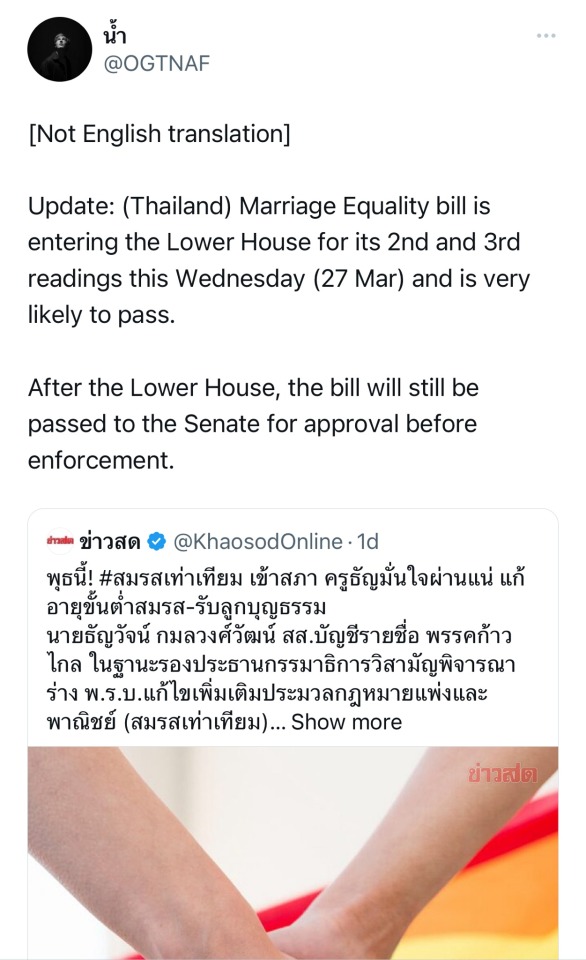
(Source and source)
Below the fold is Bloomberg.com's report on the happenings (source):
Bill to Legalize Same-Sex Marriage in Thailand Heads to Parliament
Bill is supported by most major parties, needs king approval
Thailand would be first in region to codify marriage equality
By Patpicha Tanakasempipat, March 26, 2024 at 2:00 PM PDT
A bill to legalize same-sex marriage could face a vote in Thailand’s parliament as early as Wednesday. If it passes, the country will be the first in Southeast Asia to establish marriage rights for gay and lesbian couples.
The House of Representatives will take up the legislation, technically an amendment to the Civil and Commercial Code, for second and third readings when it meets at 9 a.m. Lawmakers may vote later in the day.
The bill would legalize marriage for same-sex partners aged 18 and above, along with rights to inheritance, tax allowances and child adoption, among others. Prime Minister Srettha Thavisin’s administration has made it a signature issue, and advocates say it would also burnish Thailand’s reputation as an LGBTQ-friendly tourist destination.
Taiwan and Nepal are the only places in Asia that currently recognize same-sex marriage, and recent efforts elsewhere in the region have had mixed results. Hong Kong has yet to comply with a 2023 court order to establish laws recognizing same-sex partnerships, and India’s Supreme Court refused to legalize same-sex marriage, saying it’s an issue for parliament to consider.
The Thai bill would change the composition of a marriage from “a man and a woman” to “two individuals,” and change the official legal status from “husband and wife” to “married couple.”
Thai laws have protected LGBTQ people from most kinds of discrimination since 2015, but attempts to formalize marriage rights have stalled. In 2021, the Constitutional Court upheld the law recognizing marriage as exclusively between a man and a woman. Last year, a bill to recognize same-sex civil partnerships failed to clear parliament ahead of elections.
Rights advocates have higher hopes for the bill pending now, noting that it has broad support from most of the major parties. If it passes, it will need to be approved by the Senate and endorsed by the King. Then it would be published in the Royal Gazette and take effect 120 days later.
Srettha’s government has also promised to work on a bill to recognize gender identity, and the health ministry has also proposed legalizing commercial surrogacy to allow LGBTQ couples to adopt children. Thailand is seeking to host the WorldPride events in Bangkok in 2028.
Legalizing same-sex marriage could have positive effects on tourism, which contributes about 12% to the nation’s $500 billion economy. In 2019, before the pandemic froze international tourism, LGBTQ travel and tourism to Thailand generated about $6.5 billion, or 1.2% of gross domestic product, according to industry consultant LGBT Capital.
Formal recognition could boost the reputation of a place already considered one of Asia’s best for LGBTQ visitors, said Wittaya Luangsasipong, managing director of Siam Pride, an LGBTQ-friendly travel agency in Bangkok.
“It will become a selling point for Thailand and raise our strength in the global stage,” Wittaya said. “It will create a relaxed and safe atmosphere for tourism and help attract more and more LGBTQ visitors. We could also see more weddings by LGBTQ couples, which could generate income across industries and local communities.”
#marriage equality#marriage equality in thailand#thailand#thailand politics#pita limjaroenrat#srettha thavisin#this article is a very good look-see into how thailand has continued to leverage LGBTQ+ rights for soft power and now even hard power#lgbtq+#mileapo and freenbecky just visited with the prime minister last week#same sex marriage#same sex marriage equality
198 notes
·
View notes
Note
I had a random gut feeling that if writer and actor strikes in USA continues, capitalists may start using their pundits to incite fascists to go after the protesters. Your opinion on this perspective?
We don't know about that Anon, that seems a bit far-fetched. It's not like fascists have a 100+ year history of attacking strikers and trade unions. Unless of course you count Benito Mussolini hiring out his blackshirts as strikebreakers in 1919. Or the fascist attacks & disruptions of the 1926 general strike in the UK. Or Hitler making trade unions illegal in 1933 and then sending trade unionists to be murdered in concentration camps.
Anyways, that's all ancient history and there are no examples of recent fascist activity targeting trade unions. Aside from the fascist attack on striking railway workers in Manchester in 2019. Or the murder of Bolivian miner union leader Orlando Gutiérrez in 2020 by a mob of fascists protesting the outcome of the country's election by beating him to death. Or the 2021 attack on the headquarters of an Australian construction workers' union in Australia in 2021 by far-right extremists and anti-public health conspiracy theorists, who broke into the building and attacked union officials and union staff. Or the attack by members of the fascist Forza Nuova party on a union office in Rome, Italy that same year. Or the (failed) attempt by fascists in Albi, France to assault trade union members (only to be badly beaten themselves by the union members!) in October 2021. Or the November 2021 attack on two union members in Paris by a fascist gang.
Well anyways it's not like fascist leaders like the UK's Alek Yerbury are currently calling for his followers to target union offices, picket lines, and strikers.
You see? Nothing at all to worry about and anti-fascists shouldn't bother showing their support and solidarity with working people striking in an attempt to raise the working conditions and lives of all of us! OR MAYBE WE SHOULD???
709 notes
·
View notes
Text
UK citizens & residents, check if you have the right to vote, register to vote before 11:59pm on the 18th of June 2024 in order to be allowed to vote in the General Election.
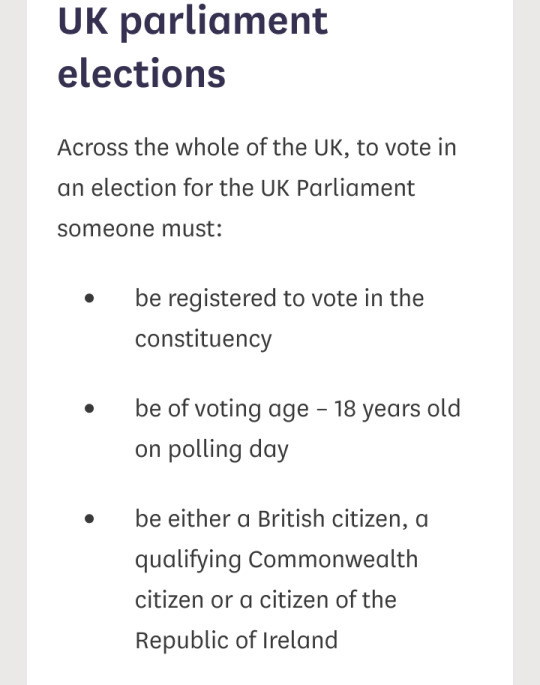
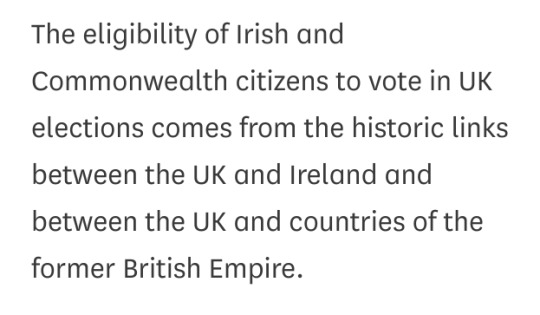
In 2019 one of my coworkers missed out on the chance to vote because he hadn't known he was eligible to vote as a Nigerian student living in the UK.
Voter registration for International Students
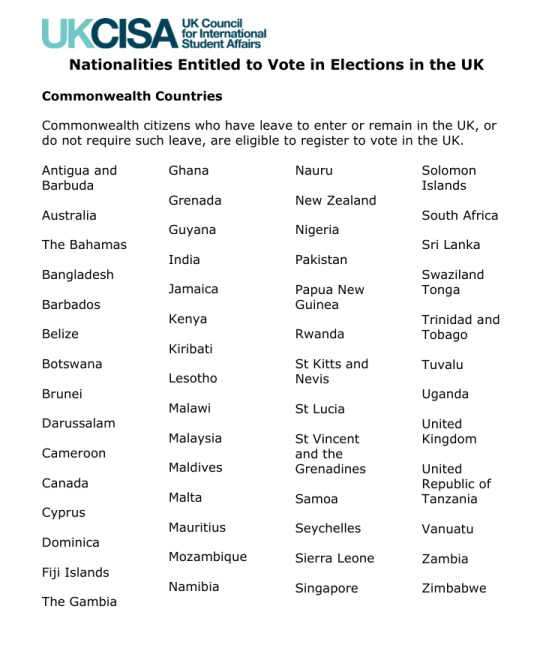
145 notes
·
View notes
Text

Happy birthday, Jeremy Corbyn! (May 26, 1949)
Leader of the British Labour Party from 2015 to 2020, Jeremy Corbyn has represented Islington North in the British Parliament since 1983. A member of the Labour Party's left wing and an acolyte of Tony Benn, Corbyn has been a vocal opponent of war and interventionism, an advocate for liberation and justice in South Africa, Palestine, and Ireland, and a supporter of socialism in the British tradition. As he made efforts to reorient the Labour Party in a socialist direction during his tenure as leader, he was deliberately and systematically undermined by the party's right wing, which launched a failed leadership challenge in 2016 and dogged him with false claims of antisemitism. After a disappointing electoral result in 2019, Corbyn stepped down as leader and, after the party right regained control, they had the party whip removed from him and refused to endorse his candidacy in the next general election.
"We don't have to be unequal, it doesn't have to be unfair, poverty isn't inevitable, things can and they will change."
453 notes
·
View notes
Text
If Benjamin Netanyahu had accepted defeat in June 2021, finally yielding the stage to a coalition of his opponents, he could have retired at the age of 71 with a decent claim to having been one of Israel’s more successful prime ministers.
He had already surpassed the time in office of Israel’s founder, David Ben-Gurion, becoming the country’s longest-serving prime minister in 2019. His second stretch in office, from 2009 to 2021, coincided with perhaps the best 12 years Israel had known since its founding in 1948. The country enjoyed relative security, with no major wars or prolonged Intifadas. The period was one of uninterrupted economic growth and prosperity. Thanks to its early adoption of widespread vaccination, Israel was one of the first countries in the world to emerge from the coronavirus pandemic. And toward the end of that span came three agreements establishing diplomatic relations with Arab countries; more were likely on the way.
Twelve years of Netanyahu’s leadership had seemingly made Israel more secure and prosperous, with deep trade and defense ties across the world. But this wasn’t enough to win him another term. A majority of Israelis had tired of him, and he had been tainted by charges of bribery and fraud in his dealings with billionaires and press barons. In the space of 24 months, Israel held four elections ending in stalemate, with neither Netanyahu nor his rivals winning a majority. Finally, an unlikely alliance of right-wing, centrist, left-wing, and Islamist parties managed to band together and replace him with his former aide Naftali Bennett in June 2021.
At that point, Netanyahu could have sealed his legacy. A plea bargain on offer from the attorney general would have ended his corruption trial with a conviction on reduced charges and no jail time. He would have had to leave politics, probably for good. Over the course of four decades in public life, including 15 years as prime minister and 22 as the Likud party’s leader, he had already left an indelible mark on Israel, dominating the second half of its history. But he couldn’t bear the thought of giving up power.
Within 18 months, he was back as prime minister for the third time. The unwieldy coalition that replaced him had imploded, and this time around, Netanyahu’s camp of far-right and religious parties ran a disciplined campaign, exploiting the weaknesses of their divided rivals to emerge with a small parliamentary majority, despite still being virtually tied in the vote count.
Nine months later, Netanyahu, the man who promised, above everything else, to deliver security for Israel’s citizens, presided over the darkest day in his country’s existence. A total breakdown of the Israeli military and intelligence structure allowed Hamas to breach Israel’s border and embark on a rampage of murder, kidnapping, and rape, killing more than 1,100 Israelis and taking more than 250 hostage. The calamities of that day, the failures of leadership leading up to it, and the traumas it caused will haunt Israel for generations. Even leaving completely aside the war he has prosecuted since that day and its yet-unknown end, October 7 means that Netanyahu will always be remembered as Israel’s worst-ever leader.
How does one measure a prime minister?
There is no broadly accepted ranking of the 13 men and one woman who have led Israel, but most lists would feature David Ben-Gurion at the top. Not only was he the George Washington of the Jewish state, proclaiming its independence just three years after a third of the Jewish people had been exterminated in the Holocaust, but his administration established many of the institutions and policies that define Israel to this day. Other favorites include Levi Eshkol, for his shrewd and prudent leadership in the tense weeks before the Six Day War, and Menachem Begin, for achieving the country’s first peace agreement with an Arab nation, Egypt.
All three of these men had mixed records and detractors, of course. Ben-Gurion had autocratic tendencies and was consumed by party infighting during his later years in office. After the Six Day War, Eshkol failed to deliver a coherent plan for what Israel should do with the new territories it occupied and the Palestinians who have remained under its rule ever since. In Begin’s second term, Israel entered a disastrous war in Lebanon, and his government nearly tanked the economy. But in most Israelis’ minds, these leaders’ positive legacies outweigh the negatives.
Who are the “worst prime ministers”? Until now, most Israelis regarded Golda Meir as the top candidate for that dismal title. The intelligence failure leading to the Yom Kippur War was on her watch. Before the war, she rejected Egyptian overtures toward peace (though some Israeli historians have recently argued that these were less than sincere). And when war was clearly imminent, her administration refrained from launching preemptive attacks that could have saved the lives of hundreds of soldiers.
Other “worst” candidates have included Ehud Olmert, for launching the second Lebanon war and becoming Israel’s first former prime minister to go to prison for corruption; Yitzhak Shamir, for kiboshing an agreement with Jordan’s King Hussein that many believe could have been a significant step toward resolving the Israel-Palestinian conflict; and Ehud Barak, for spectacularly failing to fulfill his extravagant promises to bring peace with both the Palestinians and Syria.
But Benjamin Netanyahu now surpasses these contenders by orders of magnitude. He has brought far-right extremists into the mainstream of government and made himself, and the country, beholden to them. His corruption is flamboyant. And he has made terrible security decisions that brought existential danger to the country he pledged to lead and protect. Above all, his selfishness is without parallel: He has put his own interests ahead of Israel’s at every turn.
Netanyahu has the distinction of being the only Israeli prime minister to make a once reviled movement on the right fringe of the country’s politics into a government stakeholder.
Rabbi Meir Kahane, the founder of a Jewish-supremacist group called Kach, won a lone seat in the Knesset in 1984. He openly called for replacing Israeli democracy with a constitution based on the laws of the Torah and for denying Israel’s Arab citizens equal rights. During Kahane’s single legislative term, the entire Israeli political establishment shunned him. When he got up to speak in the Knesset, all of its members would leave the plenum.
In 1985, Likud joined other parties in changing election law so that those who denied Israel’s democratic identity, denied its Jewish identity, or incited racism could be barred from running for office. Under this provision, Kach was never allowed to compete in another election. Kahane was assassinated in New York in 1990. Four years later, a member of his movement killed 29 Muslims at prayer in Hebron, and the Israeli government proscribed Kach as a terror organization and forced it to disband.
But the Kahanists didn’t go away. With each Israeli election, they tried to rename their movement and adjust its platform to conform with electoral law. They remained ostracized. Then, in 2019, Netanyahu saw a roadblock on his path to reelection that they could help him get around.
Several Israeli parties had pledged not to serve in a government led by an indicted prime minister—quite possibly, enough of them to shut Netanyahu out of power. To prevent that from happening, Netanyahu needed to eke out every possible right-wing and religious vote for his potential coalition. The polls were predicting that the latest Kahanist iteration, the Jewish Power party, which is led by the thuggish but media-savvy Itamar Ben-Gvir, would receive only about 10,000 votes, well below the threshold needed to make the party a player on its own; but Netanyahu believed that if he could persuade the Kahanists and other small right-wing parties to merge their candidates’ lists into a joint slate, together they could win a seat or two for his potential coalition—just what he needed for a majority.
Netanyahu began pressuring the leaders of the small right-wing parties to merge their lists. At first the larger of these were outraged. Netanyahu was meddling in their affairs and, worse, trying to coerce them to accept the Kahanist outcasts. Gradually, he wore down their resistance—employing rabbis to persuade politicians, orchestrating media campaigns in the nationalist press, and promising central roles in future administrations. Media figures close to Netanyahu accused Bezalel Smotrich, a fundamentalist settler and the new leader of the religious Zionist party, of “endangering” the nation by making it easier for the hated left to win the election. Soon enough, Smotrich’s old-school national-religious party merged not only with Ben-Gvir’s Jewish Power but with an even more obscure, proudly homophobic party led by Avi Maoz.
Netanyahu did worry a bit about the optics. Throughout five stalemated election campaigns from 2019 to 2022, Likud coordinated closely with Jewish Power, but Netanyahu refused to be seen in public with Ben-Gvir. During the 2022 campaign, at a religious festival, he even waited backstage for Ben-Gvir to leave the premises before going up to make his speech.
Two weeks later, there was no longer any need to keep up the act. Netanyahu’s strategy succeeded: His coalition, merged into four lists, edged out its squabbling opponents with 64 of the Knesset’s 120 seats.
Netanyahu finally had the “right-wing in full” government he had often promised. But before he could return to the prime minister’s office, his allies demanded a division of the spoils. The ministries with the most influence on Israelis’ daily lives—health, housing, social services, and the interior—went to the ultra-Orthodox parties. Smotrich became finance minister; Maoz was appointed deputy minister in charge of a new “Agency for Jewish Identity,” with power to intervene in educational programs. And Ben-Gvir, the subject of numerous police investigations for violence and incitement over a period of three decades, was put in charge of a newly titled “Ministry of National Security,” with authority over Israel’s police and prison services.
As Netanyahu signed away power to the Kahanists, he told the international news media that he wasn’t forming a far-right government. The Kahanists were joining his government. He would be in control. But Netanyahu hadn’t just given Israel’s most extreme racists unprecedented power and legitimacy. He’d also insinuated them into his own formerly mainstream party: By March 2024, Likud’s candidates for local elections in a handful of towns had merged their slates with those of Jewish Power.
Likud long prided itself on combining staunch Jewish nationalism, even militarism, with a commitment to liberal democracy. But a more radical stream within the party eschewed those liberal values and championed chauvinistic and autocratic positions. For much of the past century, the liberal wing was dominant and provided most of the party’s leadership. Netanyahu himself espoused the values of the liberal wing—until he fell out with all the main liberal figures. By 2019, none was left to oppose the alliance with Ben-Gvir’s Kahanists.
Now more than a third of Likud’s representatives were religious, and those who weren’t preferred to call themselves “traditional” rather than secular. They didn’t object to cooperating with the Kahanists; indeed, many had already worked with them in the past. In fact, many Likud Knesset members by that point were indistinguishable from the Jewish Power ones. Israel’s worst prime minister didn’t just form an alliance of convenience with the country’s most irresponsible extremists; he made them integral to his party and the running of the state.
That Netanyahu is personally corrupt is not altogether novel in the history of the Israeli prime ministership. What makes him worse than others is his open contempt for the rule of law.
By 2018, Netanyahu was the subject of four simultaneous corruption investigations that had been in motion for more than a year. In one, known as Case 4000, Netanyahu stood accused of promising regulatory favors to the owner of Israel’s largest telecom corporation in return for favorable coverage on a popular news site. Three of the prime minister’s closest advisers had agreed to testify against him.
Investigations of prime ministers are not rare in Israel. Netanyahu was the subject of one during his first term. The three prime ministers who served in the decade between his first and second terms—Ehud Barak, Ariel Sharon, and Ehud Olmert—had all been investigated as well. Only in Olmert’s case did police deem the evidence sufficient to mount a prosecution. At the time, in 2008, Netanyahu was the leader of the opposition.
“We’re talking about a prime minister who is up to his neck in investigations and has no public or moral mandate to make fateful decisions for Israel,” Netanyahu said of Olmert. “There is a concern, I have to say real, not without basis, that he will make decisions based on his personal interest of political survival and not on the national interest.”
Ten years later, Netanyahu would be the one snared in multiple investigations. Then he no longer spoke of corruption in high office but of a “witch hunt,” orchestrated by rogue police commanders and left-wing state prosecutors, and egged on by a hostile news media, all with the aim of toppling a right-wing leader.
Netanyahu was determined to politicize the legal procedure and pit his supporters against Israel’s law-enforcement agencies and judiciary. Never mind that the two previous prime ministers who had resigned because of corruption charges were from the center left. Nor did it matter that he had appointed the police commissioner and attorney general himself; both were deeply religious men with impeccable nationalist backgrounds, but he tarred them as perfidious tools of leftist conspiracy.
Rather than contemplate resignation, on May 24, 2020, Netanyahu became the first sitting Israeli prime minister to go on trial. He has denied all wrongdoing (the trial is still under way). In a courthouse corridor before one session, he gave a 15-minute televised speech accusing the legal establishment of “trying to topple me and the right-wing government. For over a decade, the left wing have failed to do this at the ballot box, and in recent years have come up with a new idea. Elements in the police and prosecutor’s office have joined left-wing journalists to concoct delusional charges.”
The law didn’t require Netanyahu to resign while fighting the charges against him in court. But doing so had seemed logical to his predecessors under similar circumstances—and to Israel’s lawmakers, who had never envisaged that a prime minister would so brazenly challenge the justice system, which he had a duty to uphold. For Netanyahu, however, remaining in power was an end in itself, one more important than preserving Israel’s most crucial institutions, to say nothing of Israelis’ trust in them.
Netanyahu placed extremists in positions of power, undermined confidence in the rule of law, and sacrificed principle to power. Little wonder, then, that last summer, tensions over the role of Israel’s judiciary became unmanageable. The crisis underlined all of these reasons that Netanyahu should go down as Israel’s worst prime minister.
For 34 of the past 47 years, Israel’s prime ministers have come from the Likud party. And yet many on the right still grumble that “Likud doesn’t know how to rule” and “you vote right and get left.” Likudniks complain about the lingering power of “the elites,” a left-wing minority that loses at the ballot box but still controls the civil service, the upper echelons of the security establishment, the universities, and the media. A growing anti-judicial wing within Likud demands constitutional change and a clamping-down on the supreme court’s “judicial activism.”
Netanyahu had once minimized these complaints, but his stance on the judiciary changed after he was indicted in 2019. Indeed, at the start of his current term, Likud’s partners demanded commitments to constitutional change, which they received. The ultra-Orthodox parties were anxious to pass a law exempting religious seminary students from military service. Such exemptions had already fallen afoul of the supreme court’s equality standards, so the religious parties wanted the law to include a “court bypass.” Netanyahu acceded to this. To pass the legislation in the Knesset, he appointed Simcha Rothman, a staunch critic of the court, as the chair of the Knesset’s Constitution Committee.
He also appointed Yariv Levin, another fierce critic of the court, as justice minister. Just six days after the new government was sworn in, Levin rolled out a “judicial reform” plan, prepared by a conservative think tank, that called for drastically limiting the court’s powers to review legislation and gave politicians control over the appointment of new justices.
Within days, an extremely efficient counter-campaign pointed out the dangers the plan posed, not just to Israel’s fragile and limited democracy, but to its economy and security. Hundreds of thousands of Israelis protested in the streets. Likud began to drop in the polls, and Netanyahu privately urged the leaders of the coalition parties to delay the vote. They refused to back down, and Levin threatened to resign over any delay.
Netanyahu’s motives, unlike those of his partners, were not ideological. His objective was political survival. He needed to keep his hard-won majority intact and the judges off-balance. But the protests were unrelenting. Netanyahu’s independent-minded defense minister, Yoav Gallant, pointed to the controversy’s dire implications for the Israel Defense Forces as hundreds of volunteer reserve officers threatened to suspend their service rather than “serve a dictatorship.”
Netanyahu wasn’t sure he wanted to go through with the judicial coup, but the idea of one of Likud’s senior ministers breaking ranks in public was unthinkable. On March 25 of last year, Gallant made a public statement that the constitutional legislation was a “clear and major threat to the security of Israel” and he would not be voting for it. The next evening, Netanyahu announced that he was firing Gallant.
In Jerusalem, protesters besieged Netanyahu’s home. In Tel Aviv, they blocked main highways. The next morning, the trade unions announced a general strike, and by that evening, Netanyahu backed down, announcing that he was suspending the legislation and would hold talks with the opposition on finding compromises. Gallant kept his post. The talks collapsed, protests started up again, and Netanyahu once again refused to listen to the warnings coming from the security establishment—not only of anger within the IDF, but that Israel’s enemies were planning to take advantage of the country’s disunity to launch an attack.
The debate over judicial reform pitted two visions of Israel against each other. On one side was a liberal and secular Israel that relied on the supreme court to defend its democratic values; on the other, a religious and conservative Israel that feared that unelected judges would impose incompatible ideas on their Jewish values.
Netanyahu’s government made no attempt to reconcile these two visions. The prime minister had spent too many years, and all those toxic electoral campaigns, exploiting and deepening the rift between them. Even when he belatedly and halfheartedly tried to rein in the radical and fundamentalist demons he had ridden back into office, he found that he could no longer control them.
Whether Netanyahu really meant to eviscerate Israel’s supreme court as part of a plot to weaken the judiciary and intimidate the judges in his own case, or whether he had no choice in the matter and was simply a hostage of his own coalition, is immaterial. What matters is that he appointed Levin as justice minister and permitted the crisis to happen. Ultimately, and despite his professed belief in liberal democracy, Netanyahu allowed Levin and his coalition partners to convince him that they were doing the right thing—because whatever kept him in office was right for Israel. Democracy would remain strong because he would remain in charge.
Trying to diminish the powers of the supreme court isn’t what makes Netanyahu Israel’s worst prime minister. The judicial reform failed anyway. Only one of its elements got through the Knesset before the war with Hamas began, and the court struck it down as unconstitutional six months later. The justices’ ruling to preserve their powers, despite the Knesset’s voting to limit them, could have caused a constitutional crisis if it had happened in peacetime. But by then Israel was facing a much bigger crisis.
Given Israel’s history, the ultimate yardstick of its leaders’ success is the security they deliver for their fellow citizens. In 2017, as I was finishing my unauthorized biography of Netanyahu, I commissioned a data analyst to calculate the average annual casualty rate (Israeli civilians and soldiers) of each prime minister since 1948. The results confirmed what I had already assumed. In the 11 years that Netanyahu had by then been prime minister, the average annual number of Israelis killed in war and terror attacks was lower, by a considerable margin, than under any previous prime minister.
My book on Netanyahu was not admiring. But I felt that it was only fair to include that data point in his favor in the epilogue and the very last footnote. Likud went on to use it in its 2019 campaigns without attributing the source.
The numbers were hard to argue with. Netanyahu was a hard-line prime minister who had done everything in his power to derail the Oslo peace process and prevent any move toward compromise with the Palestinians. Throughout much of his career, he encouraged military action by the West, first against Iraq after 9/11, and then against Iran. But in his years as prime minister, he balked at initiating or being dragged into wars of his own. His risk aversion and preference for covert operations or air strikes rather than ground operations had, in his first two stretches in power, from 1996 to 1999 and 2009 to 2021, kept Israelis relatively safe.
Netanyahu supporters on the right could also argue, on basis of the numbers, that those who brought bloodshed upon Israel, in the form of Palestinian suicide bombings and rocket attacks, were actually Yitzhak Rabin and Shimon Peres, the architects of the Oslo Accords; Ehud Barak, with his rash attempts to bring peace; and Ariel Sharon, who withdrew Israeli soldiers and settlers unilaterally from Gaza in 2005, creating the conditions for Hamas’s electoral victory there the following year. That argument no longer holds.
If future biographers of Israeli prime ministers undertake a similar analysis, Netanyahu will no longer be able to claim the lowest casualty rate. His 16th year in office, 2023, was the third-bloodiest in Israel’s history, surpassed only by 1948 and 1973, Israel’s first year of independence and the year of the Yom Kippur War, respectively.
The first nine months of 2023 had already seen a rise in deadly violence in the West Bank and East Jerusalem, as well as terrorist attacks within Israel’s borders. Then came the Hamas attack on October 7, in which at least 1,145 Israelis were massacred and 253 kidnapped and taken to Gaza. More than 30 hostages are now confirmed dead.
No matter how the war in Gaza ends, what happens in its aftermath, or when Netanyahu’s term finally ends, the prime minister will forever be associated above all with that day and the disastrous war that followed. He will go down as the worst prime minister because he has been catastrophic for Israeli security.
To understand how Netanyahu so drastically failed Israel’s security requires going back at least to 2015, the year his long-term strategic bungling of the Iranian threat came into view. His mishandling didn’t happen in isolation; it is also related to the deprioritization of other threats, including the catastrophe that materialized on October 7.
Netanyahu flew to Washington, D.C., in 2015 to implore U.S. lawmakers to obstruct President Barack Obama’s nuclear deal with Iran. Many view this gambit as extraordinarily damaging to Israel’s most crucial alliance—the relationship with the United States is the very bulwark of its security. Perhaps so; but the stunt didn’t make subsequent U.S. administrations less supportive of Israel. Even Obama would still go on to sign the largest 10-year package of military aid to Israel the year after Netanyahu’s speech. Rather, the damage Netanyahu caused by presuming too much of the United States wasn’t to the relationship, but to Israel itself.
Netanyahu’s strategy regarding Iran was based on his assumption that America would one day launch an attack on Iran’s nuclear program. We know this from his 2022 book, Bibi: My Story, in which he admits to arguing repeatedly with Obama “for an American strike on Iran’s nuclear facilities.” Senior Israeli officials have confirmed that he expected Donald Trump to launch such a strike as well. In fact, Netanyahu was so sure that Trump, unlike Obama, would give the order that he had no strategy in place for dealing with Iran’s nuclear program when Trump decided, at Netanyahu’s own urging, to withdraw from the Iran deal in May 2018.
Israel’s military and intelligence chiefs had been far from enamored with the Iran deal, but they’d seized the opportunity it presented to divert some of the intelligence resources that had been focused on Iran’s nuclear program to other threats, particularly Tehran’s network of proxies across the region. They were caught by surprise when the Trump administration ditched the Iran deal (Netanyahu knew it was coming but didn’t inform them). This unilateral withdrawal effectively removed the limitations on Iran’s nuclear development and required an abrupt reversal of Israeli priorities.
Senior Israeli officials I spoke with had to tread a wary path here. Those who were still in active service couldn’t challenge the prime minister’s strategy directly. But in private some were scathing about the lack of a coherent strategy on Iran. “It takes years to build intelligence capabilities. You can’t just change target priorities overnight,” one told me.
The result was a dissipation of Israeli efforts to stop Iran—which is committed to the destruction of Israel. Iran sped further than ever down the path of uranium enrichment, and its proxies, including the Houthis in Yemen and Hezbollah on Israel’s northern border, grew ever more powerful.
In the months leading up to October 7, Israel’s intelligence community repeatedly warned Netanyahu that Iran and its proxies were plotting a major attack within Israel, though few envisaged something on the scale of October 7. By the fall of 2023, motives were legion: fear that an imminent Israeli diplomatic breakthrough with Saudi Arabia could change the geopolitics of the region; threats that Ben-Gvir would allow Jews greater access to the al-Aqsa Mosque in Jerusalem and worsen conditions for Palestinian prisoners; rumors that the deepening tensions within Israeli society would render any response to an attack slow and disjointed.
Netanyahu chose to ignore the warnings. The senior officers and intelligence chiefs who issued them were, to his mind, conspiring with the law-enforcement agencies and legal establishment that had put him on trial and were trying to obstruct his government’s legislation. None of them had his experience and knowledge of the real threats facing Israel. Hadn’t he been right in the past when he’d refused to listen to leftist officials and so-called experts?
Hamas’s surprise attack on October 7 was the result of a colossal failure at all levels of Israel’s security and intelligence community. They had all seen the warning signals but continued to believe that the main threat came from Hezbollah, the larger and far better-equipped and trained enemy to the north. Israel’s security establishment believed that Hamas was isolated in Gaza, and that it and the other Palestinian organizations had been effectively deterred from attacking Israel.
Netanyahu was the originator of this assumption, and its biggest proponent. He believed that keeping Hamas in power in Gaza, as it had been for nearly two years when he returned to office in 2009, was in Israel’s interest. Periodic rocket attacks on Israeli communities in the south were a price worth paying to keep the Palestinian movement split between the Fatah-dominated Palestinian Authority in the West Bank enclaves and Hamas in Gaza. Such division would push the troublesome two-state solution off the global agenda and allow Israel to focus on regional alliances with like-minded Arab autocracies that also feared Iran. The Palestinian issue would sink into irrelevance.
Netanyahu’s disastrous strategy regarding Gaza and Hamas is part of what makes him Israel’s worst prime minister, but it’s not the only factor. Previous Israeli prime ministers, too, blundered into bloody wars on the basis of misguided strategies and faulty advice from their military and intelligence advisers.
Netanyahu stands out from them for his refusal to accept responsibility, and for his political machinations and smear campaigns since October 7. He blames IDF generals and nourishes the conspiracy theory that they, in alliance with the protest movement, somehow allowed October 7 to happen.
Netanyahu believes that he is the ultimate victim of that tragic day. Convinced by his own campaign slogans, he argues that he is the only one who can deliver Israel from this valley of shadows to the sunlit uplands of “total victory.” He refuses to consider any advice about ending the war and continues to prioritize preserving his coalition, because he appears incapable of distinguishing between his own fate, now tainted by tragic failure, and that of Israel.
Many around the world assume that Israel’s war with Hamas has proceeded according to some plan of Netanyahu’s. This is a mistake. Netanyahu has the last word as prime minister and head of the emergency war cabinet, but he has used his power mainly to prevaricate, procrastinate, and obstruct. He delayed the initial ground offensive into Gaza, hesitated for weeks over the first truce and hostage-release agreement in November, and is now doing the same over another such deal with Hamas. For the past six months, he has prevented any meaningful cabinet discussion of Israel’s strategic goals. He has rejected the proposals of his own security establishment and the Biden administration. He presented vague principles for “the day after Hamas” to the cabinet only in late February, and they have yet to be debated.
However one views the war in Gaza—as a justified war of defense in which Hamas is responsible for the civilian casualties it has cynically hidden behind, or as an intentional genocide of the Palestinian people, or as anything in between—none of it is Netanyahu’s plan. That’s because Netanyahu has no plan for Gaza, only one for remaining in power. His obstructionism, his showdowns with generals, his confrontations with the Biden administration—all are focused on that end, which means preserving his far-right coalition and playing to his hard-core nationalist base.
Meanwhile, he’s doing what he has always done: wearing down and discrediting his political opponents in the hope of proving to an exhausted and traumatized public that he’s the only alternative. So far, he’s failing. Polls show that an overwhelming majority of Israelis want him gone. But Netanyahu is fending off calls to hold an early election until he believes he is within striking distance of winning.
Netanyahu’s ambition has consumed both him and Israel. To regain and remain in office, he has sacrificed his own authority and parceled out power to the most extreme politicians. Since his reelection in 2022, Netanyahu is no longer the center of power but a vacuum, a black hole that has engulfed all of Israel’s political energy. His weakness has given the far right and religious fundamentalists extraordinary control over Israel’s affairs, while other segments of the population are left to pursue the never-ending quest to end his reign.
One man’s pursuit of power has diverted Israel from confronting its most urgent priorities: the threat from Iran, the conflict with the Palestinians, the desire to nurture a Westernized society and economy in the most contested corner of the Middle East, the internal contradictions between democracy and religion, the clash between tribal phobias and high-tech hopes. Netanyahu’s obsession with his own destiny as Israel’s protector has caused his country grievous damage.
Most Israelis already realize that Netanyahu is the worst of the 14 prime ministers their country has had in its 76 years of independence. But in the future, Jews might even remember him as the leader who inflicted the most harm on his people since the squabbling Hasmonean kings brought civil war and Roman occupation to Judea nearly 21 centuries ago. As long as he remains in power, he could yet surpass them.
78 notes
·
View notes
Text
So I made a post about this article back when it came out in November 2023, but in light of us having a General Election in just over a month, it feels pertinent to bring it up again.
A tl/dr of it would be that within the past six years or so, two separate UN experts on poverty and human rights have assessed the UK and both have found that the poverty levels are horrific and unacceptable.
The first was a report done by Philip Alston in 2019; the second expert, Olivier De Schutter is the UN's current special rapporteur on extreme poverty and human rights and who visited the country at the end of 2023, and he accused the government of violating human rights in regards to poverty.
Both experts put the blame squarely on the Tories and their policies.
The first expert compared austerity to a Victorian era workhouse and accused the government of “systematic immiseration of a significant part of the British population”. At the time of that report, the government responded with denial and accusations of political bias.
The second expert rightfully pointed out that the government's refusal to engage with what Alston had reported had led to a rise in poverty, specifically that a fifth of UK residents live in poverty. He described the welfare state as “a leaking bucket” and again, he blamed the Tories and their policies.
This time, the government responded with fluffy words and empty promises that are not even in line with what De Schutter recommended.
I think it's important to bring this up again right now because in 37 days, we will be selecting what party will govern us for five more years.
In five years, the level of poverty in this country went from deeply concerning to breaching human rights laws.
Do you want to hand them the keys to number 10 for another five years? Do you want to see how much worse it can get?
Because I fucking don't and that's why I'm gonna (tactically) vote for Labour on July 4th. I fucking beg you to join me in voting the Tories out.
#uk politics#britpol#britposting#british politics#uk general election#general election#tories out#fuck the tories#the guardian#please vote#for the love of god#fucking vote#poverty
100 notes
·
View notes
Text
Info about European Parliament elections
Because the elections to the European Parliament are approaching (6-9 of June), I wanted to make some kind of master post about it to see if I understand it better and to give some tips. But I forgot we're talking about the fucking European Union and all its levels and sublevels and the respect to each country doing whatever the fuck they want. You may want to watch the series Parliament. It's funny and you will understand how the EU works better than I could ever explain it (I am not kidding).
THANKFULLY, the EU knows the mess it all is and they created a very clear and easy to use website just for this: https://elections.europa.eu.
It gives you general info and a guide for your country. I want to kiss in the mouth to whoever designed the website and wrote the text. Whatever it is they are paid, it's not enough.
IF READING THIS POST IN ENGLISH IS HARD FOR YOU, THAT WEBSITE, AS MOST EU WEBSITES/INFO, IS TRANSLATED INTO EVERY OFFICIAL LANGUAGE OF THE EU.
The most important thing about these elections is that the European Parliament represents the interests of the European citizens. Copying from that website I gave: The European Commission is the EU’s executive branch, responsible for proposing and implementing EU law and the day-to-day running of the EU. The European Parliament, representing the interests of EU citizens, and the Council, representing the interests of the countries, shape Commission proposals and, if they agree on them, adopt them.
This is important to know because the Parliament will elect the new President of the European Commission who later will examine and approve the entire College of Commissioners. But this is another thing, so go check wikipedia about the President of the European Comission. In the last elections there was some mix-up between the candidate, the system and who ended up being president (current president is Ursula von der Leyen, chosen in 2019).
The European parliament is separated into 7 political groups. 23 members are necessary to create a group and each group must represent at least a quarter of the countries in the EU (again, watch Parliament, this is very well explained there in a fun way). Here you can find the list of the political groups (if you click each link, they send you to the website of the group and you can look for who/which party from your country is part of it). Some people do not belong to any political group.
From what I see, those 7 political groups include:
4 Right-wing groups (some say "center-right" but they may be right-right. 2 of them are clearly called something like "Christian democrats" or "Conservatives")
1 green party
1 left party
1 center-leftish party
Not all of the websites for these political groups are in several languages of the EU, but they are all in English. Here you can see how many members of the parliament belong to each group by country. In short, you can see where your country is leaning in the European parliament. For instance, Spain has 13 christian democrats, 9 "center-right" and 4 right vs 21 "center-left", 3 green and 6 left, plus 3 non registered in any group for a total of 59 members.
In reality, we do not vote for those political groups. We vote for politicians in our countries and then, they, if they want, they join one group or another. In short, if you vote a left-wing party from your country, it is likely that they will be part of The Left political group of the European parliament.
Historically, over 50% of the parliament is a group of right and another group of center-right. No sé qué de los nazis por Europa estos últimos años. This is how it looks like right now. The yellow party is right-wing adjacent too (Renew Europe), so you can see how it currently looks for the left (green and red colours, where the dark red colour is The Left and the bright red is center-left). The gray one do not belong to any political group.
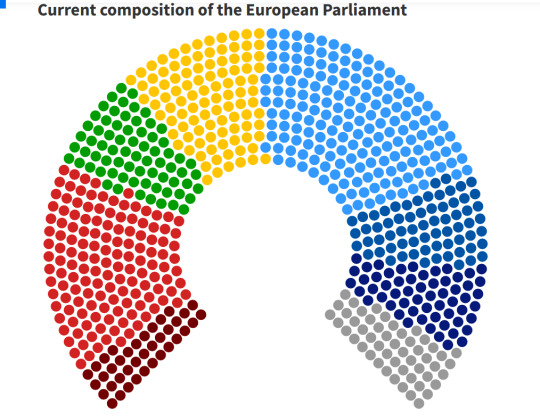
In other elections, about 50% of the population did not vote (which may be why there are more right-wing parties than others, just saying).
So yeah, vote. This organ represents you and your interests directly. They are the ones who adopt laws that affect anyone and everyone.
Vote because the European Parliament is your voice in the EU.
#EU#European parliament#elections#european elections#European parliament elections#parliament#parlement
88 notes
·
View notes